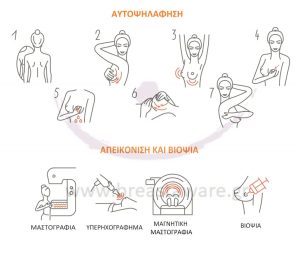
How Is the Breast Examined? Everything You Need to Know
Early diagnosis is the most important step for the prevention and successful management of breast conditions. Breast care begins with education and prevention—and every woman can take an active role.
Breast Self-Examination
Breast self-examination (or self-palpation) is a simple, non-invasive procedure that every woman can perform on her own once a month. Through this process, a woman becomes familiar with the normal appearance and texture of her breasts, which helps in the early detection of any changes.
Signs That Require Medical Evaluation:
- Palpable lump in the breast or armpit
- Change in size, shape, or texture of the breast
- Nipple retraction or unusual discharge
- Skin changes (redness, thickening, dimpling)
- Persistent or unusual pain
Breast Imaging Evaluation
Digital Mammography
Digital mammography is the primary screening examination for women aged 40 years and older, in accordance with the guidelines of the American Cancer Society and European Society of Breast Imaging.
It is highly effective in detecting non-palpable lesions and significantly increases the chances of early diagnosis. Annual screening is recommended for this age group.
Breast Ultrasonography
Ultrasound is widely used in younger women (under 40) or in women with dense breasts, as it provides high-resolution imaging without the use of ionizing radiation.
It is also used in conjunction with mammography for the evaluation of suspicious or inconclusive findings.
It has been demonstrated that it increases the sensitivity of screening when added to mammography in women at high risk for breast cancer.
Magnetic Resonance Imaging (MRI) of the Breast
Breast magnetic resonance imaging (MRI) is not a routine screening test.
It is recommended in special cases, such as:
- Womens with BRCA1/2 mutations
- Significant family history of breast cancer
- Prior thoracic radiotherapy
- Discordant results between mammography and ultrasonography
- Womens with silicone implants
MRI has high sensitivity, but is accompanied by increased rates of false-positive findings, which may lead to unnecessary biopsies.
Breast Biopsy
The Biopsy is the only method that can establish a definitive diagnosis for a suspicious breast lesion.
It is performed by obtaining a tissue sample, usually with a fine or core needle under local anesthesia, without the need for surgery.
According to the ACR BI-RADS Atlas, biopsy is indicated for lesions classified as BI-RADS 4 and 5. Most biopsies today are performed under ultrasound or mammographic guidance (stereotactic biopsy).
The biopsy result determines the subsequent management of the lesion—whether simple monitoring or therapeutic intervention.
In summary
Breast cancer prevention relies on education, self-awareness, and regular monitoring using appropriate diagnostic methods. Each individual is unique, which is why screening should be personalized, under the guidance of a specialized mastologist or breast surgeon.
Check Your Breast – Give Yourself Health and Safety
Information and prevention are key. At breastaware.gr you will find scientifically validated information for every stage of breast screening and learn how to properly care for yourself.
Bibliography:
- Independent UK Panel on Breast Cancer Screening. Lancet. 2012;380(9855):1778–1786.
- Oeffinger KC, et al. JAMA. 2015;314(15):1599–1614.
- American College of Radiology. ACR Practice Parameters. 2023.
- Sardanelli F, et al. Eur Radiol. 2017;27(7):2737–2743.
- Berg WA, et al. JAMA. 2012;307(13):1394–1404.
- D'Orsi CJ, et al. ACR BI-RADS Atlas. 5th ed. 2013.
- Kuhl CK, et al. Lancet. 2007;370(9586):485–492.
- Ciatto S, et al. AJR Am J Roentgenol. 2007;188(3):733–738.
- NCCN Breast Cancer Screening Guidelines. Version 2.2024.
- Saslow D, et al. CA Cancer J Clin. 2007;57(2):75–89.
